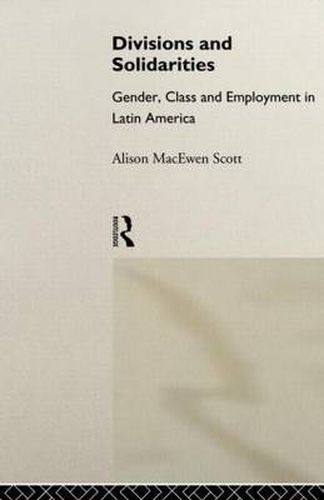Readings Newsletter
Become a Readings Member to make your shopping experience even easier.
Sign in or sign up for free!
You’re not far away from qualifying for FREE standard shipping within Australia
You’ve qualified for FREE standard shipping within Australia
The cart is loading…






Is class analysis osbolete or just misguided? In Divisions and Solidarities Alison MacEwen Scott defends the concept of class by expanding it to encompass power, status, mobility and consumption. She does this through a major critique of theories of urban employment and class structure, using case study material from Peru to examine and test theories which will be of great interest to social scientists in general. The book stresses the crucial importance of class and gender in analysing the situation of the urban poor in Latin America. The author argues that gender is deeply embedded in the labouring class’ not only via gender segregation at work but through the role of the family in forging solidarity across internal class division. She believes that in the past class analysis has placed too much emphasis on labour market divisions and not enough on broader solidarities created by mobility, consumption patterns and kinship. She shows that gender is an important dimension of inequality, strongly linked to class, and that class cannot be understood without reference to gender and the family. This incorporation of gender into class analysis forces a reformulation of class itself, and does much to explain patterns of consciousness and action amongst the urban poor in Latin America. With its new approach to class analysis, Divisions and Solidarities will have a wide appeal across many disciplines. It will be of special interest to teachers and students of anthropology, sociology, economics, politics, development and gender studies. Alison MacEwen Scott is Senior Lecturer in Sociology at the University of Essex.
$9.00 standard shipping within Australia
FREE standard shipping within Australia for orders over $100.00
Express & International shipping calculated at checkout
Is class analysis osbolete or just misguided? In Divisions and Solidarities Alison MacEwen Scott defends the concept of class by expanding it to encompass power, status, mobility and consumption. She does this through a major critique of theories of urban employment and class structure, using case study material from Peru to examine and test theories which will be of great interest to social scientists in general. The book stresses the crucial importance of class and gender in analysing the situation of the urban poor in Latin America. The author argues that gender is deeply embedded in the labouring class’ not only via gender segregation at work but through the role of the family in forging solidarity across internal class division. She believes that in the past class analysis has placed too much emphasis on labour market divisions and not enough on broader solidarities created by mobility, consumption patterns and kinship. She shows that gender is an important dimension of inequality, strongly linked to class, and that class cannot be understood without reference to gender and the family. This incorporation of gender into class analysis forces a reformulation of class itself, and does much to explain patterns of consciousness and action amongst the urban poor in Latin America. With its new approach to class analysis, Divisions and Solidarities will have a wide appeal across many disciplines. It will be of special interest to teachers and students of anthropology, sociology, economics, politics, development and gender studies. Alison MacEwen Scott is Senior Lecturer in Sociology at the University of Essex.